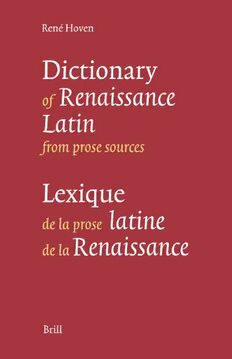
Lexique de la prose latine de la Renaissance: Dictionary of Renaissance Latin from prose sources PDF
744 Pages·2006·4.128 MB·English
Most books are stored in the elastic cloud where traffic is expensive. For this reason, we have a limit on daily download.
Preview Lexique de la prose latine de la Renaissance: Dictionary of Renaissance Latin from prose sources
Description:
Rene Hoven's "Dictionary of Renaissance Latin from Prose Sources" has since its first appearance in 1994 become a recognised and valued resource for Latinists and Neo-Latinists, and all those historians of Humanism, of the Renaissance, of the Reformation and Counter-Reformation. Now revised and expanded for this second edition (with the collaboration of Laurent Grailet), it contains almost 11,000 entries (excluding variant spellings and other simple repetitions). The number of authors from Western and Central Europe covered has risen from 150 to more than 230, adding to an original authors list which included Ficino, Petrarch, Pico de la Mirandola, Poggio, Politian, Valla, Bude, Calvin, Erasmus, Lipsius, Luther, Melanchton, More and Vives, the prose works of among others Ermolao Barbaro, Bembo, Giordano Bruno, Buchanan, John Colet, Copernicus, Olaus Magnus, Paracelsus, Perotti, Pontanus and Vesalius. The revised work offers coverage of an even wider variety of genres, from literature to science and medicine, collections of correspondence, travelogues, scholarly works, art, historiography, law, rhetoric, philosophy, theology, questions related to the Reformation and Counter-Reformation, as well as Neo-Latin translations of ancient Greek works. The originally Latin-French dictionary now also gives an English translation for every entry of a Renaissance Latin term, with reference to context. The words or meanings which are already found in Le Grand Gaffiot - Dictionnaire latin-francais are not taken into account. Entries carry indications of whether a word with a specifically Renaissance Latin meaning had earlier but different usages in Classical, Late Antique and Medieval Latin, and parallel usages are given from ancient Greek and the vernaculars. The work contains a full list of sources, separate lists of words of non-Latin origin, diminutives and of words classified by given suffixes or endings and an essay of Thomas More on the Neo-Latin usages.
See more
The list of books you might like
Most books are stored in the elastic cloud where traffic is expensive. For this reason, we have a limit on daily download.
